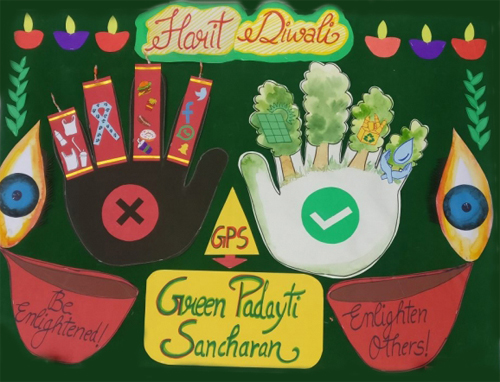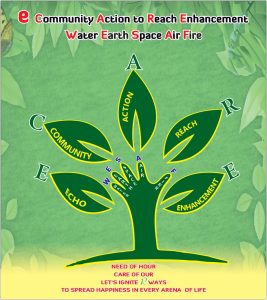SEED (SRIJAN EK E-VIRASAT DRIVE)
A revolution by Ramians
The planet is currently facing an increasing number of environmental challenges, which include climate change, global warming, droughts, water scarcity, floods, and pollution. We, at SHRIRAM resolutely believe that children, as early as possible, should be aware of the environmental issues we’re facing. We, as a responsible school have a responsibility towards future generations – not just teaching them how to read and write, but also educating them about environmental awareness It is for this reason, our school is leading the conversation about environmental issues with these young and impressionable minds.

Harit Diwali – “Swasth Diwali”–
It is a campaign launched by the Ministry of Environment. We, as a responsible institute support this whole heartedly. During this intensive campaign, the children are advised to celebrate Diwali in an environment-friendly manner by gifting plant sapling to their relatives and friends along with sweets, undertake cleaning of houses, neighborhoods, schools, collect old books and unused notebooks gift to needy children, donate old warm clothing, blankets to night-shelters and other homeless people.
At SHRIRAM, we have introduced an e-period dedicated not only to environmental awareness but also to ethics and values that our dedicated teachers are trying to inculcate in the students who also very enthusiastically imbibe the values taught. Once well versed in environmental issues, they can use that knowledge to create beneficial project in your home and in your community.
1. Green Padyati of Sancharan (GPS)
Students use pebbles, sticks, dried flowers and twigs to create an image of a children’s park. The activity follows an updating of their knowledge on: the state of the environment, waste collection rules, and ways in which we can contribute to solving the problems of pollution currently facing the environment.
Practicing previously learned habits, skills and care of protecting the environment and to instill a proactive ecological attitude is the central aim of this action.
2. SAMNAVAY WASTE ARTICLE SUSTAINABILITY (SWAS)
Time to time, students are involved in activities wherein they learn to reuse waste articles. Under this Drive, our school encourages parents to share their environmental knowledge to their kids at home. We insist parents to let the children practice at home doing small tasks like picking up their trash and throwing the garbage, or teaching them to turn off the faucet when they’re brushing their teeth or washing their hands with soap and not let water run down, or shut off the lights when they’re done using them. This will help them be more knowledgeable about environmental issues.
3. Network of Well being (NOW)
Day by day we see how nature suffers from the indifference and carelessness of people whose behavior damages our environment. We love nature and the gifts that it offers, but being thankful is not enough. Thus, we gather young and old, children, teachers and parents, to plant small trees in the courtyard of the kindergarten to show that voluntary acts have no obstacles or age limits.
4. e- Virasat
To instill values & ethics in our students, we have deviced various methodologies. To begin with, prayers during school assembly are an integral part of our school curriculum. Apart from e-period , we also incorporate values through the teaching of geography and literature. It is through dramas, role plays and other co-curricular activities that we integrate ethics and values in our school curriculum. This makes our students to be socially responsible citizens of our country.
5. How the Ramian teachers lead by example-
Most people remember things that people did more than what they said. Teaching children what it means to be environmentally aware is important but it will have a more lasting impact if teachers can lead by example.
For teachers, when they see litter, they pick it up even if it’s not theirs. Those little eyes might be watching them do so.
They are often seen reusing even the tiniest bit of paper.
They organize tree planting days at school and tell them why trees are important to the environment.
Encourage children to switch off all appliances and lights when not in use.
Ensure taps are closed properly after you have used them and use water sparingly.
6. The school management has suggested the following steps to parents-
According to the EPA transportation adds to 33% of the total atmospheric CO₂ so instead of driving your ward to school, take the school bus, carpool, walk, or ride your bike to cut down on greenhouse gas emissions.
Buy reusable products such as glass bottles, reusable bags and cups etc. Avoid buying paper towels, plastic bottles and bags.
Start composting and recycling, which will help cut down our waste production.
Support local businesses and farmers by only buying organic food at farmers markets. Make sure the food is pesticide free. This will help your community become self-reliant.
Consider investing in appropriate technology like clean power (solar or wind), if not for your home maybe for a community center. This will also help wean ourselves off fossil fuels. The school itself uses solar power as the main source of electricity.

